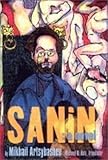Sanin : A Novel / Mikhail Artsybashev.
Material type: TextPublisher: Ithaca, NY : Cornell University Press, [2018]Copyright date: ©2001Description: 1 online resource (280 p.)Content type:
TextPublisher: Ithaca, NY : Cornell University Press, [2018]Copyright date: ©2001Description: 1 online resource (280 p.)Content type: - 9781501720680
- 891.73/3 21
- PG3453.A8 S33 2001
- online - DeGruyter
| Item type | Current library | Call number | URL | Status | Notes | Barcode | |
|---|---|---|---|---|---|---|---|
 eBook
eBook
|
Biblioteca "Angelicum" Pont. Univ. S.Tommaso d'Aquino Nuvola online | online - DeGruyter (Browse shelf(Opens below)) | Online access | Not for loan (Accesso limitato) | Accesso per gli utenti autorizzati / Access for authorized users | (dgr)9781501720680 |
Frontmatter -- Contents -- Acknowledgments -- Translator~s Note -- Introduction -- Principal Characters -- Sanin -- Afterword -- Selected Bibliography
restricted access online access with authorization star
http://purl.org/coar/access_right/c_16ec
"It evoked almost unprecedented discussions, like those at the time of Turgenev's Fathers and Sons. Some praised the novel far more than it deserved, others complained bitterly that it was a defamation of youth. I may, however, without exaggeration assert that no one in Russia took the trouble to fathom the ideas of the novel. The eulogies and condemnations are equally one-sided." Thus did Mikhail Artsybashev (1878–1927), whose novels and short stories are suffused with themes of sex, suicide, and murder, describe the reaction to publication in 1907 of Sanin, his second novel. The work provoked heated debates among the Russian reading public, and the journal in which it was published serially was soon closed down by the authorities.The hero of Artsybashev's novel exhibits a set of new values to be contrasted with the morality of the older Russian intelligentsia. Sanin is an attractive, clever, powerful, life-loving man who is, at the same time, an amoral and carnal animal, bored both by politics and by religion. During the novel he lusts after his own sister, but defends her when she is betrayed by an arrogant officer; he deflowers an innocent-but-willing virgin; and encourages a Jewish friend to end his self-doubts by committing suicide. Sanin's extreme individualism greatly appealed to young people in Russia during the twilight years of the Romanov regime. "Saninism" was marked by sensualism, self-gratification, and self-destruction—and gained in credibility in an atmosphere of moral and spiritual despondency.Artybashev drew upon a wide range of sources for his inspiration—Sanin owes debts to Dostoevsky's Notes from Underground, Nietzsche's notion of the "superman," and the work of the individualist anarchist philosopher Johann Kaspar Schmidt. Michael R. Katz's translation of this controversial novel is the first into English in almost seventy years."Russian pornography is not plain pornography such as the French and Germans produce, but pornography with ideas."—Kornei Chukovsky"Those who saw in the much discussed novel only suggestive scenes, shocking their morality or titillating their senses, were mistaken; it was, as usual in Russia, a book with a message, and Sanin slept with all his mistresses to prove a thesis rather than to obey a natural urge."—Marc Slonim
Mode of access: Internet via World Wide Web.
In English.
Description based on online resource; title from PDF title page (publisher's Web site, viewed 26. Apr 2024)


